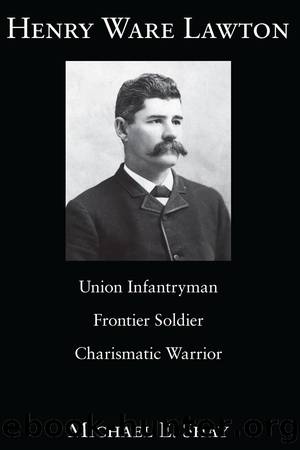Henry Ware Lawton by Michael E. Shay

Author:Michael E. Shay [Shay, Michael E.]
Language: eng
Format: epub
Tags: History, General, Military, United States, Biography & Autobiography
ISBN: 9780826273659
Google: JBSkDgAAQBAJ
Publisher: University of Missouri Press
Published: 2017-06-01T00:29:24+00:00
8
Cuba
War with Spain
Tampa, Florida, was chosen as the point of embarkation for Cuba, and a more inefficient venue would be hard to imagine. Officers and men assigned to the 4th and 5th Army Corps arrived daily, with no apparent plan of action, inevitably leading to chaos. For one thing, Tampa itself lay nine miles inland from Port Tampa, which was reached via a single track, which, in turn, served a single wharf. With one exception, the city was composed of nondescript wooden structures and unpaved streets, ankle deep with sand.
When Lieutenant Colonel Theodore Roosevelt arrived there with the 1st U.S. Volunteer Cavalry Regiment (âRough Ridersâ), he observed: âTampa lay in the pine-covered sand flats at the end of a one-track railroad, and everything connected with both military and railroad matters was in an almost inextricable tangle.â Rail cars were backed up for miles, well into the hinterland, and there was no way of knowing just what matériel each contained without literally opening each and every car at random, with the hope that, sooner or later, one would contain the object of the search. In short, in the words of historian Ivan Musicant, Port Tampa was âthe worst of all possible worlds.â Secretary Alger would eventually be blamed for the confusion and inefficiency.1
The notable exception to all the chaos was a large, modern, brick hotel, built in the Moorish style seven years earlier by developer and entrepreneur Henry Plant, who also owned the rail and shipping line. The Tampa Bay Hotel served as army headquarters, providing comfortable billets for the officers as well, while most of the troops established tent camps in the pine woods at nearby Tampa Heights, where the enemy was gnats and mosquitoes. One cavalry officer, no doubt a guest, quipped: âOnly God knows why Plant built an hotel here; but thank God he did.â The hotelâs long, broad front porch was a natural gathering place for the officers, who had a chance to renew old acquaintances and swap stories while sitting in rocking chairs awaiting orders. Correspondent Richard Harding Davis referred to this time as âthe rocking-chair period of the war.â Elsewhere, all was not serene. For the enlisted men, heat and boredom inevitably led to unruly behavior, which spread fear among the populace and generated many complaints. Dockside, âLast Chance Street,â a ramshackle row of false fronts, offered the usual soldierly diversions until it accidently burned to the ground after most of the troops had already boarded ship.2
Download
This site does not store any files on its server. We only index and link to content provided by other sites. Please contact the content providers to delete copyright contents if any and email us, we'll remove relevant links or contents immediately.
The Sympathizer by Viet Thanh Nguyen(4370)
The Rape of Nanking by Iris Chang(4188)
World without end by Ken Follett(3456)
Ants Among Elephants by Sujatha Gidla(3449)
Blood and Sand by Alex Von Tunzelmann(3179)
Japanese Design by Patricia J. Graham(3149)
The Queen of Nothing by Holly Black(2573)
City of Djinns: a year in Delhi by William Dalrymple(2541)
Foreign Devils on the Silk Road: The Search for the Lost Treasures of Central Asia by Peter Hopkirk(2451)
India's Ancient Past by R.S. Sharma(2438)
Inglorious Empire by Shashi Tharoor(2421)
Tokyo by Rob Goss(2414)
In Order to Live: A North Korean Girl's Journey to Freedom by Yeonmi Park(2369)
Tokyo Geek's Guide: Manga, Anime, Gaming, Cosplay, Toys, Idols & More - The Ultimate Guide to Japan's Otaku Culture by Simone Gianni(2352)
India's biggest cover-up by Dhar Anuj(2341)
The Great Game: On Secret Service in High Asia by Peter Hopkirk(2324)
Goodbye Madame Butterfly(2241)
Batik by Rudolf Smend(2163)
Living Silence in Burma by Christina Fink(2052)
